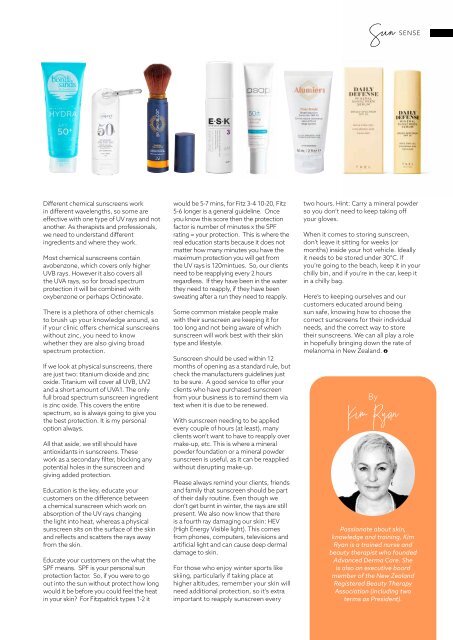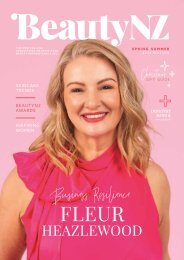BeautyNZ Magazine Autumn 2024
BeautyNZ magazine is a professional beauty trade magazine published on behalf of the New Zealand Association of Registered Beauty Professionals Inc. The NZARBP is recognised as the premier industry organisation with a 50 year history of supporting members, regulating the industry, and promoting a qualified workforce. The non-profit group educates, informs, provides advice, and keeps the industry up-to-date with the latest information through its magazine.
BeautyNZ magazine is a professional beauty trade magazine published on behalf of the New Zealand Association of Registered Beauty Professionals Inc. The NZARBP is recognised as the premier industry organisation with a 50 year history of supporting members, regulating the industry, and promoting a qualified workforce. The non-profit group educates, informs, provides advice, and keeps the industry up-to-date with the latest information through its magazine.
You also want an ePaper? Increase the reach of your titles
YUMPU automatically turns print PDFs into web optimized ePapers that Google loves.
Sun SENSE<br />
Different chemical sunscreens work<br />
in different wavelengths, so some are<br />
effective with one type of UV rays and not<br />
another. As therapists and professionals,<br />
we need to understand different<br />
ingredients and where they work.<br />
Most chemical sunscreens contain<br />
avobenzone, which covers only higher<br />
UVB rays. However it also covers all<br />
the UVA rays, so for broad spectrum<br />
protection it will be combined with<br />
oxybenzone or perhaps Octinoxate.<br />
There is a plethora of other chemicals<br />
to brush up your knowledge around, so<br />
if your clinic offers chemical sunscreens<br />
without zinc, you need to know<br />
whether they are also giving broad<br />
spectrum protection.<br />
If we look at physical sunscreens, there<br />
are just two: titanium dioxide and zinc<br />
oxide. Titanium will cover all UVB, UV2<br />
and a short amount of UVA1. The only<br />
full broad spectrum sunscreen ingredient<br />
is zinc oxide. This covers the entire<br />
spectrum, so is always going to give you<br />
the best protection. It is my personal<br />
option always.<br />
All that aside, we still should have<br />
antioxidants in sunscreens. These<br />
work as a secondary filter, blocking any<br />
potential holes in the sunscreen and<br />
giving added protection.<br />
Education is the key, educate your<br />
customers on the difference between<br />
a chemical sunscreen which work on<br />
absorption of the UV rays changing<br />
the light into heat, whereas a physical<br />
sunscreen sits on the surface of the skin<br />
and reflects and scatters the rays away<br />
from the skin.<br />
Educate your customers on the what the<br />
SPF means. SPF is your personal sun<br />
protection factor. So, if you were to go<br />
out into the sun without protect how long<br />
would it be before you could feel the heat<br />
in your skin? For Fitzpatrick types 1-2 it<br />
would be 5-7 mins, for Fitz 3-4 10-20, Fitz<br />
5-6 longer is a general guideline. Once<br />
you know this score then the protection<br />
factor is number of minutes x the SPF<br />
rating = your protection. This is where the<br />
real education starts because it does not<br />
matter how many minutes you have the<br />
maximum protection you will get from<br />
the UV rays is 120mintues. So, our clients<br />
need to be reapplying every 2 hours<br />
regardless. If they have been in the water<br />
they need to reapply, if they have been<br />
sweating after a run they need to reapply.<br />
Some common mistake people make<br />
with their sunscreen are keeping it for<br />
too long and not being aware of which<br />
sunscreen will work best with their skin<br />
type and lifestyle.<br />
Sunscreen should be used within 12<br />
months of opening as a standard rule, but<br />
check the manufacturers guidelines just<br />
to be sure. A good service to offer your<br />
clients who have purchased sunscreen<br />
from your business is to remind them via<br />
text when it is due to be renewed.<br />
With sunscreen needing to be applied<br />
every couple of hours (at least), many<br />
clients won’t want to have to reapply over<br />
make-up, etc. This is where a mineral<br />
powder foundation or a mineral powder<br />
sunscreen is useful, as it can be reapplied<br />
without disrupting make-up.<br />
Please always remind your clients, friends<br />
and family that sunscreen should be part<br />
of their daily routine. Even though we<br />
don’t get burnt in winter, the rays are still<br />
present. We also now know that there<br />
is a fourth ray damaging our skin: HEV<br />
(High Energy Visible light). This comes<br />
from phones, computers, televisions and<br />
artificial light and can cause deep dermal<br />
damage to skin.<br />
For those who enjoy winter sports like<br />
skiing, particularly if taking place at<br />
higher altitudes, remember your skin will<br />
need additional protection, so it’s extra<br />
important to reapply sunscreen every<br />
two hours. Hint: Carry a mineral powder<br />
so you don’t need to keep taking off<br />
your gloves.<br />
When it comes to storing sunscreen,<br />
don’t leave it sitting for weeks (or<br />
months) inside your hot vehicle. Ideally<br />
it needs to be stored under 30°C. If<br />
you’re going to the beach, keep it in your<br />
chilly bin, and if you’re in the car, keep it<br />
in a chilly bag.<br />
Here’s to keeping ourselves and our<br />
customers educated around being<br />
sun safe, knowing how to choose the<br />
correct sunscreens for their individual<br />
needs, and the correct way to store<br />
their sunscreens. We can all play a role<br />
in hopefully bringing down the rate of<br />
melanoma in New Zealand.<br />
By<br />
Kim Ryan<br />
Passionate about skin,<br />
knowledge and training, Kim<br />
Ryan is a trained nurse and<br />
beauty therapist who founded<br />
Advanced Derma Care. She<br />
is also an executive board<br />
member of the New Zealand<br />
Registered Beauty Therapy<br />
Association (including two<br />
terms as President).



